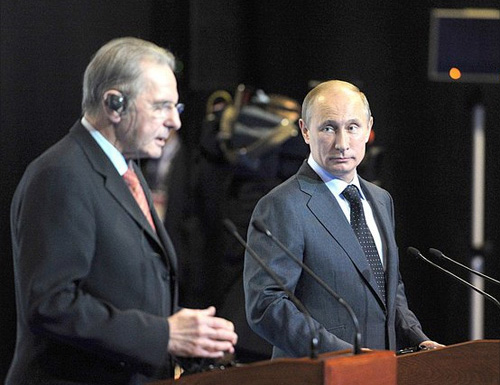Crime and punishment: an Olympic version
One of the best political blogs of the USA Тhinkprogress.org once again reminds us of the situation in Russia exactly six months before the start of the Olympics in the Black Sea resort of Sochi. A homophobic law passed in the country that outlaws "propaganda of nontraditional sexual relationships" and punishes any instance of it with draconian penalties, and foreigners – with arrest, 15-days jail time, and possible deportation.
After that the International Olympic Committee demanded "assurances" from the Russian government that the law wouldn't apply to Olympians or fans. Russian officials were confused in the testimony and in the end agreed that the law would apply only for those foreigners who "would encourage minors to engage in non-traditional sex", although forcing minors to have sex – and not just same-sex – a crime, and it is from another legal area, which is regulated by entirely different laws.
At the same time IOC declared that it would take measures… in relation to any athlete who would speak out against homophobic law during the Olympics.
Olympic athletes are called on to show support for Russian LGBT citizens, to show their solidarity with them. Speed skater Blake Skjellerup from New Zealand, has pledged to wear a rainbow pin at the Games. However the blog with the link on GayStarNews writes, that if the athletes dares to do something like that – they will risk violating Rule 50 of the Olympic charter, which states: "No kind of demonstration or political, religious or racial propaganda is permitted in any Olympic sites, venues or other areas."

"The IOC has a clear rule laid out in the Olympic Charter (Rule 50) which states that the venues of the Olympic Games are not a place for proactive political or religious demonstration. This rule has been in place for many years and applied when necessary. In any case, the IOC would treat each case individually and take a sensible approach depending on what was said or done", – stated the IOC spokesperson and added that any athlete who violates that rule could be punished with disqualification.
It's understandable why the IOC doesn't want political, religious, or racial statements flooding every Olympic Games. The Olympics are, indeed, supposed to be a time when politics are set aside and the world comes together, and at many previous Olympics, those statements could have run contra to the Olympic mission that promotes inclusion and tolerance in sports.
But in this case this is about a different issue. Advocating for human rights and tolerance of LGBT people, for one, isn't "political propaganda" and isn't even about politics. It's about basic human rights and decency. It's about basic rights to compete, attend competitions, participate or live life as the person you are without fear of retribution, insults, being beaten up and killed in the streets.
During the award ceremony of the Olympic Games of 1968 in Mexico City dark-skinned US athletes Tommie Smith, who won a gold medal, and John Carlos, who won a bronze medal, raised black-gloved fists on the medal stand during the national anthem. At the press conference, they said that with this gesture they wanted to demonstrate their disagreement with racism in the United States. After that, the both athletes were suspended from their national team.

Observers believe that any pro-LGBT sentiment expressed in Sochi, meanwhile, won't be undermining the Olympic Mission but upholding it. That's especially important right now, since even though the IOC says it has assurances and even as IOC president Jacques Rogge says the Olympics "should be open to all, free of discrimination," the IOC has done little to promote that tolerance and inclusion itself.
Would the IOC dare punish an athlete like Skjellerup who dons a pride pin or speaks out on behalf of both LGBT athletes and LGBT Russians? Not likely, said observer's blog. Because otherwise they will have a scandal of unprecedented scale, even more resonant than is happening right now. Television channels like NBC, BBC and others will have an extra reason to look to the Russian homophobic law from an entirely new angle. It would also give LGBT rights proponents from activist groups to President Obama an even larger platform to call for change.
In all likelihood, the IOC will have some troubles, since it is already has a sad reputation of a notoriously slow and corrupted structure. In addition, action generates reaction, so in the case of penalties for Olympian for rainbow pin, other athletes, even the ones who were going to remain silent, can support similar actions.
Thereby Тhinkprogress.org assumed that the athletes who want to speak out shouldn't fear. Any athlete who takes a stand will find a far more supportive media and world behind them than Smith and Carlos found in Mexico City. Today the situation has changed from what it was in 1968, when Smith and Carlos raised their hands up on the pedestal of Mexico City. But the International Olympic Committee should think carefully on not how to punish athletes if they try to defend the principles of the Olympic movement, but how to influence the government, which incites hatred, fanaticism and violence against people just for the fact that they are born that way, what were born. It is unlikely that we will wait for something like that from IOC officials who do not want any trouble, but we most definitely should expect the gestures of support from the Olympic athletes.
Автор: APO “Gay-Alliance Ukraine”

